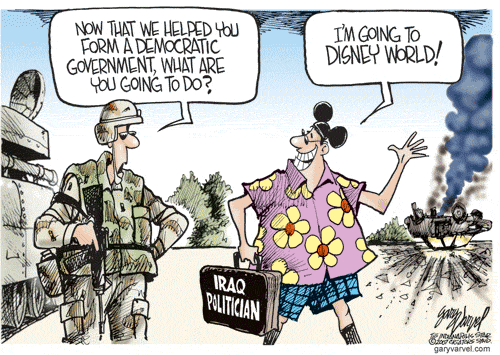Friday, August 24, 2007
AFP: US intelligence gives grim outlook on Iraq


US intelligence gives grim outlook on Iraq
by Jim MannionFri Aug 24, 10:01 AM ET
US spy agencies have given a grim assessment of Iraq's future, warning that the leadership is unable to govern effectively and a drawdown of US forces could increase sectarian violence.
In response to the new intelligence estimate released Thursday, just weeks ahead of another key report on Iraq, the White House appealed for patience and insisted that US counterinsurgency tactics were showing results.
But the administration's efforts were dealt yet another blow when a key Republican lawmaker, John Warner, said the Iraqi leadership had "let our troops down" and urged a US military withdrawal to begin in time for Christmas.
The intelligence estimate warned that "the Iraqi government will become more precarious over the next six to 12 months because of criticism by other members of the major Shia coalition" as well as Sunni and Kurdish parties.
Barring "a fundamental shift in factors driving Iraqi political and security developments," compromises needed for "sustained security, long-term political progress, and economic development are unlikely to emerge," it said.
The update, which represents the consensus of 16 US intelligence agencies, comes just weeks before General David Petraeus, the US commander in Iraq, and US Ambassador Ryan Crocker offer their own assessment of US strategy in a report due on September 15.
The declassified judgments of the assessment came amid mounting US frustration over the lack of political progress in Iraq after Bush earlier in the year ordered 30,000 more troops to Iraq -- boosting US forces on the ground to 160,000 -- in a bid to improve security.
Iraqi leaders who are already "unable to govern effectively" will struggle to achieve national political reconciliation, it warned.
Iraqi Prime Minister Nuri al-Maliki, under pressure due to the resignations of 17 members of his 40-person cabinet, has so far failed to deliver any major pieces of legislation aimed at promoting reconciliation between Sunnis and Shiites.
On Friday, Iraqi Vice President Tareq al-Hashemi said that his Sunni party had no intent to return to the embattled Baghdad government unless its demands for reform were met.
The Sunni National Concord Front, led by Hashemi's Iraqi Islamic Party, quit the government on August 1, accusing it of failing to rein in Shiite militias and of the arbitrary arrest and detention of Sunni citizens.
Bush this week expressed his frustration with the lack of progress, only to reaffirm his support for Maliki the following day, calling him a "good man with a difficult job."
Overall, the intelligence report said there have been "measurable but uneven" improvements in Iraq's security, adding however that the "level of overall violence, including attacks on and casualties among civilians, remains high."
The report did not repeat recent military assertions that civilian deaths have decreased by 50 percent.
Iraqi security forces have performed adequately, but have not improved enough to conduct major operations independent from US-led coalition forces, it said.
Changing the coalition's mission to focus on providing combat support for Iraq's security forces and fighting Al-Qaeda "would erode security gains achieved thus far," it warned.
White House spokesman Gordon Johndroe pledged support for the Iraqi government and said the assessment shows "that our strategy has improved the security environment in Iraq, but that we still face very tough challenges ahead."
Just hours after the assessment came out, Senator Warner urged Bush to start a limited withdrawal of US troops from Iraq to signal the Maliki administration and regional nations that the US commitment to Iraq is not open-ended.
"Certainly in 160,000-plus (US troops in Iraq), say, 5,000 could begin to redeploy and be home to their families and loved ones no later than Christmas of this year," said Warner, who recently returned from a trip to Iraq.
The United States "simply cannot, as a nation, stand and put our troops at continuous risk of loss of life and limb without beginning to take some decisive action which will get everybody's attention."
He added: "I really firmly believe the Iraqi government, under the leadership of Prime Minister Maliki, have let our troops down."
The intelligence report said that perceptions of a US pullout "probably will encourage factions anticipating a power vacuum to seek local security solutions that could intensify sectarian violence and intra-sectarian competition.